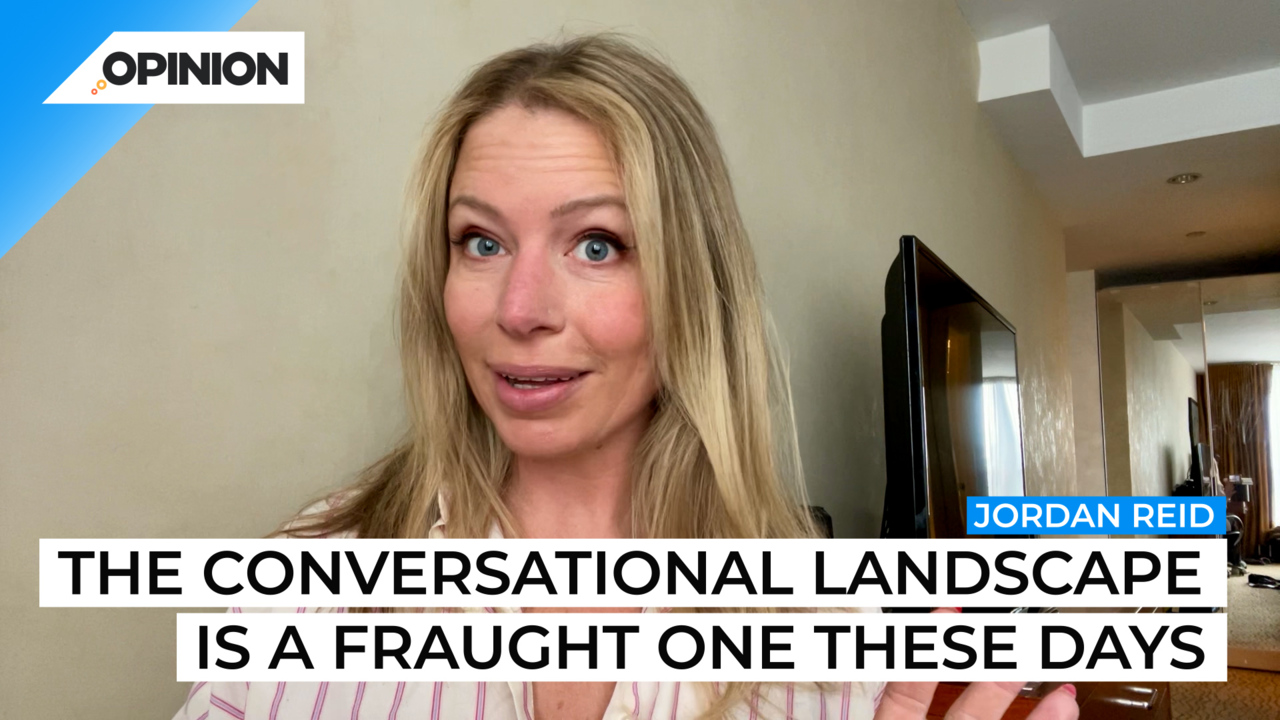
Commentary
-
Our commentary partners will help you reach your own conclusions on complex topics.
I read an article the other day in New York Magazine about the “New Rules” of etiquette – including making tipping your extravagance (yes, concur) and “no name-dropping celebrity nicknames” – he may be Bobby to you, but let’s call him Robert DeNiro in polite company.
One topic the article didn’t cover, to my consternation: How to gracefully navigate a world in which everyone has an opinion, and wants to tell you that yours Is wrong.
I know the pandemic’s effects are still making themselves known, and we’re all still in the process of remembering how to function in restaurants and on planes and such – but what I’m talking about is basic, straightforward human communication. Small talk, if you will.
The conversational landscape is a fraught one, these days. The etiquette surrounding not talking about things like politics – or money, or, trans athletes, or even who uses what bathroom when using which body part – has dissolved, and in many ways that’s a positive thing. We’re saying the quiet parts out loud. But this increased willingness to communicate one’s views seems to go hand-in-hand with a total belief in their absolute, factual accuracy. And the vastness of topics that politics have seeped into have left seemingly everyone with an opinion on seemingly everything.
The other day, I struck up a conversation in a nail salon with a woman who referred to the pandemic as a “plandemic.” It took me a minute to follow what she was getting at, but by then another woman a few seats down was already warning her (maybe us?) to watch what we say around here. To be clear, I had no horse in this race; I just wanted to get my nails done. I went with Ferrari Red, by the way.
Another example: At my child’s scout meeting, I got into a conversation about vaccines – just a bad idea across the board, but it wasn’t my choice – with a couple of parents who were medical professionals. But they were anti-vax. And – I think – anti-Ukraine. So pro Russia? And also very into wellness, and all of this was way too much for me to follow.
So what does a person who does not want to get into the minutiae of politics over a quick polish change do? I think Step 1 has to be: Assume you don’t really know what the person you’re talking to has been through. They could be coming off a nice long chat about Chinese spy balloons with their Aunt Gwendolyn, or have just read an article that’s gotten them – rightly or wrongly – fired up, they could be grieving a loss. Or they could be going through their own personal issues that you have no idea about.
Step 2? If you have the emotional bandwidth, I find that asking questions always works. If you want to engage and share your own opinions, sure, but from the standpoint that your conversational companion may not be up for a listen. And when all else fails? Just do what I did at the scout meeting: Say, “you know, that’s interesting, but I don’t really follow politics.” And then, if you’re me, cross your fingers and hope they don’t google you.
-
Americans must reject Trump to defend our democracy
At the end of the Republican National Convention, Donald Trump accepted the nomination as the GOP candidate for president. In the first part of his acceptance speech, Trump called for unity and healing, although he derailed into partisanship as he continued. Critics have debated the media’s role in handling Trump’s speech. Some argued he was…
-
It’s time for Kamala Harris to pick up the torch
Debates have continued among Democrats about whether President Joe Biden is the best candidate for the 2024 election or whether an alternative Democratic leader might be more electable. While there’s no shortage of fellow Democratic leaders to choose from, President Biden and his supporters have continued to assert that Biden can and will win as…
-
Republicans want to sabotage US education
Former President Donald Trump’s official educational policy platform reveals plans to eliminate the Department of Education and seize the financial assets and endowments of elite U.S. universities. These proposals and others have convinced some liberal critics that the true goal of Republicans is to intentionally weaken U.S. education. Watch the above video as Straight Arrow…
-
Despite poor debate performance, Biden deserves our support
President Joe Biden himself admits that he delivered a “bad” performance in the first 2024 presidential debate. About a week after what some consider to be the worst debate performance in the history of televised debates, polls indicate that more voters than ever have an unfavorable opinion of the president, believe he is too old…
-
The modern-day Republican woman has terrifying role models
In a recent New York Magazine cover story entitled, “How Did Republican Women End Up Like This,” Rebecca Traister writes about some of the more polarizing examples of female Republican leaders and their positions on abortion, the transgender movement and women in general. With Republican women set to play a major role in the November…
Latest Opinions
-
 U.S. Department of Defense
U.S. Department of Defense
Congress still trying to figure out how to reduce wasteful military spending
-
 DVIDS
DVIDS
US Navy, Air Force making waves with new weapons at RIMPAC
-
 Getty Images
Getty Images
Israeli PM Netanyahu meets with Trump at Mar-a-Lago
-
 Getty Images
Getty Images
Growing US nuclear power resurgence reaches the nation’s heartland
-
 Getty Images
Getty Images
Beer from the sun, other solar thermal projects get government funding
Popular Opinions
-
In addition to the facts, we believe it’s vital to hear perspectives from all sides of the political spectrum.


